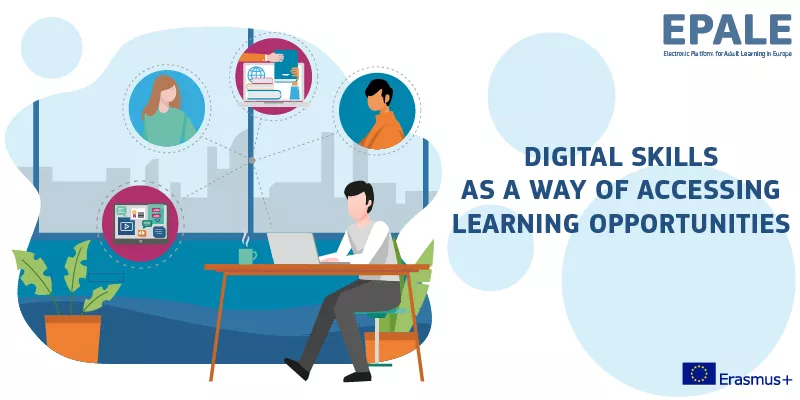EPALE discussion: digital skills as a way of accessing learning opportunities

As part of our April-June 2020 focus on Digital skills as a way of accessing learning opportunities, EPALE is organising an online discussion.
The large number of adults with poor basic digital skills represents a major obstacle in achieving an inclusive society and reducing social inequalities. Too few adults have access to adult learning resources, and this has a real impact on their personal development and employment prospects.
Providing adult-specific teaching methods to help trainers to become more effective in their work requires specialised training and continuous professional development geared towards adult-specific teaching strategies.
Moreover, the Covid-19 pandemic has forced everyone to adapt to new ways of working and pushed adult educators to explore and adopt new online tools and techniques to allow them continue their training and learning activities.
The discussion will take place on this page on 27 May between 10:00 and 16:00 CET and will be moderated by EPALE Thematic Coordinator Altheo Valentini and by EPALE Content Assistant Claudia D'Eramo.
► Share your stories, tips, case studies and good practices with the EPALE community!
Also, if you’ve ever been involved in successful projects, or if you have developed any relevant methodologies – share your story with the other participants in the comments below!
The discussion on 27 May will include the following topics:
|
► Comments will be open on 20 May so participants can introduce themselves or post their comments in advance.
Nóta tráchta
You never forget good partners!
Education for sustainable development
Share your story
thank you for your contribution. Why don't you share your story and your peer mentoring experience in our Community Stories initiative?
I'd really like to discover more about it, and I'm sure our communty would benefit from it!
Claudia D'Eramo, EPALE Moderator
Digital inclusion
Digital inclusion
If we start with a mobile
Opinion
Autority support
Authority support
Digital Inclusion
I totally agree with you regarding the digital inclusion issue.
Digital skills for the elderly
Do lots of eldery people
Useful does it
Digital skills
In Latvia elderly people are
Motivation
Digital inclusion among older people
Thanks for sharing the efforts Jelgava is doing to enhance digital skills among the elderly. This is such an interesting topic and something we'll focus in the next few months on EPALE.
If you want to have a look at similar experiences across Europe, you may be interested in the Community Stories of our EPALE members from Serbia (Milica Buha) and Finland (Juhani Pörtfors and Matti Sarvirant) who promoted digital inclusion among older people.
Claudia D'Eramo, EPALE Moderator
Digital skills
Very interesting and great
MEDEA - Developing competences for a digital workplace at work
Link with EU digital competence framework?
Possibly
The Future Teacher: professionalization based on DigCompEdu
Thanks for mentioning
Online learning resources for adult educators
Language volunteers in the coronavirus era
WhatsApp as a learning method?
Not a simple transition
Same in Germany
Dear Ramon,Students of my
Hello Ramon, I totally agree
The rapid (and necessary) transition from face-to-face learning to digital learning opportunities has meant that no structures could be developed. Neither technical structures for platforms and tools nor structures for the design of digital learning settings. Here in Germany, for example, a lot of work was done with conference tools. Mostly the tool was used which the teachers knew or which was available at a reasonable price. Platforms were not always used, but entire seminar days were conducted with conference tools. This was quite exhausting for many participants. It might have been better to choose a mixture of independent, asynchronous work on one platform and synchronous work with conference tools.
Sometimes - as you described - platforms were used that were currently available.
I hope that we will gradually get more structure and select the tools and possibilities used according to pedagogical criteria and target groups. And I also hope that we put a lot of energy into the didactic design of digital learning offers.


Greetings from Heike and to Irene